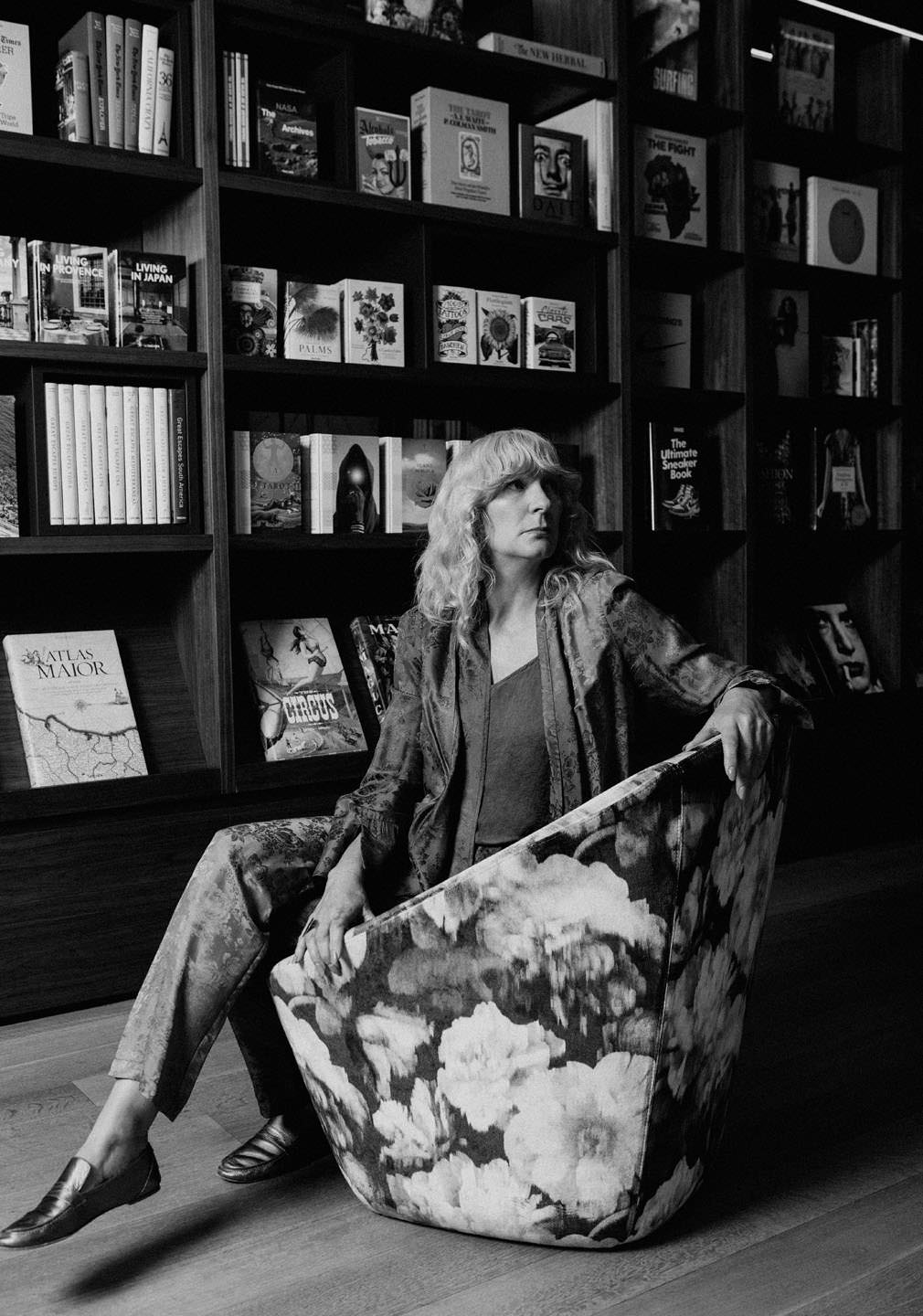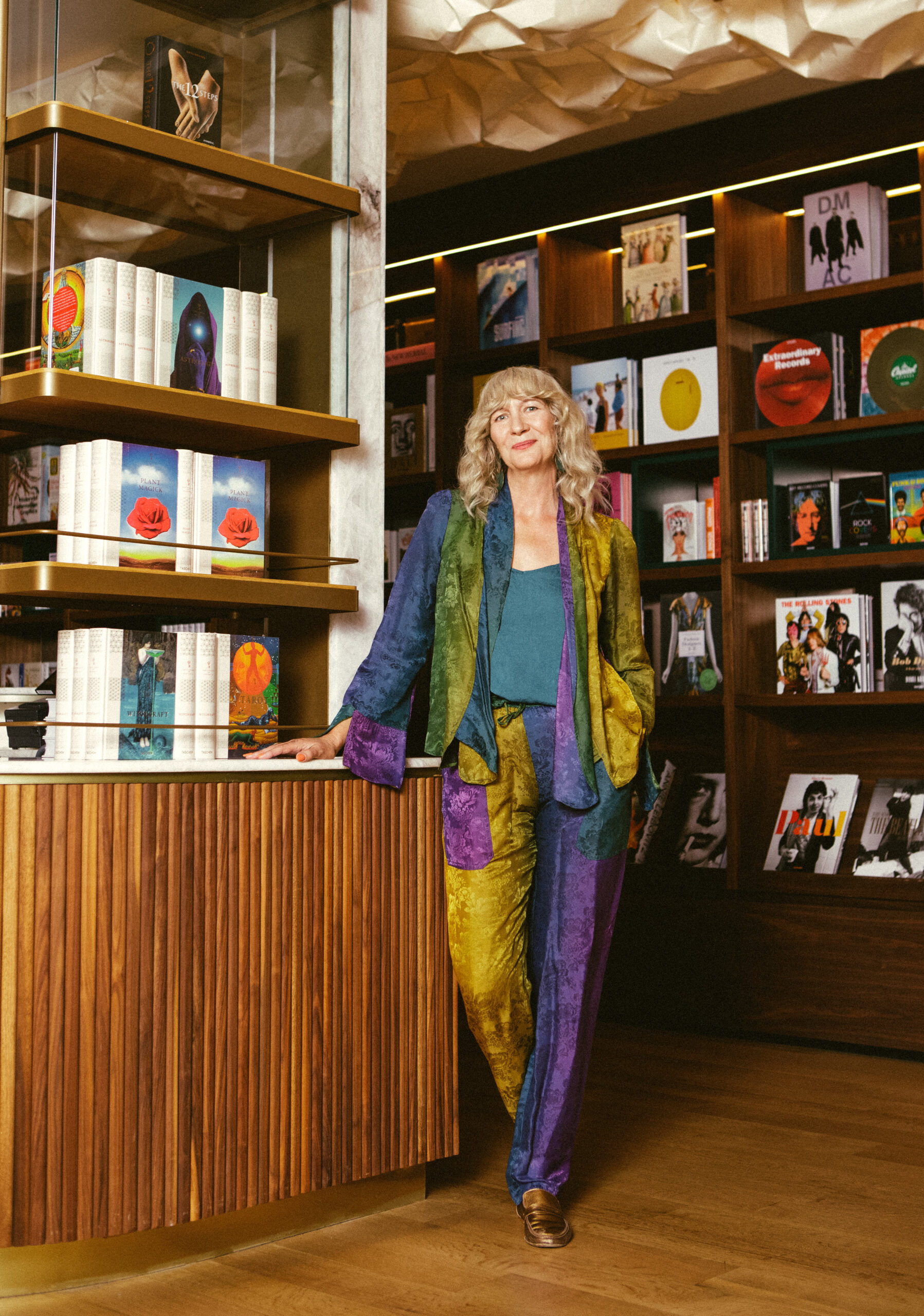I suspect Jessica Hundley is a Gemini even before I meet her. Her resumé gives her away. A prolific writer and multihyphenate creative with charmingly varied and seemingly inexhaustible interests, she exhibits the insatiable curiosity, boundless energy, and penchant for communication that define the third sign of the zodiac.
“It’s like definitely every box is checked,” the journalist, author, filmmaker, and creative director says with a laugh, confirming my hunch when we meet in mid-June in the Taschen Library at the Fairmont Pacific Rim. “It’s figuring out the balance, how to stay in the centre of the Gemini insanity.”
In person, the 54-year-old Hundley is warm and enthusiastic. Her long, feathered, silver-blond hair and thick bangs recall the California dreamers of the 1970s. Based in L.A., she is in Vancouver to talk about The Library of Esoterica collection she produced with renowned art-book publisher Taschen. The series of visual encyclopedias includes Tarot, Astrology, Witchcraft, and Plant Magick, with a fifth, Sacred Sites, set to be released in the fall.
Hundley, who edited, art-directed, and conducted interviews for each, describes the collection as her babies, the pinnacle of a formidable career that’s included such highlights as collaborating with David Lynch, John Legend, and the late photographer David Kramer, known for his work with Bob Dylan.
It began with tarot, Hundley says of her interest in the metaphysical and of the first book in the series. “I had a tarot deck as a kid. I’ve always been fascinated by tarot, pulling cards for myself, but also by all of esoteric thought and philosophy.” She pitched The Library of Esoterica to Taschen after working on a different book with the publisher, one of several collaborations she’s undertaken over the past decade as a writer and editor.
The Secret Teachings of All Ages was released in 1928, with only 400 copies of the original edition. The book, compiled by Canadian philosopher and mystical scholar Manly P. Hall, was the result of a months-long expedition across the world to visit sacred sites and learn from various religious and spiritual traditions. Hall returned to his Los Angeles home with a plethora of artifacts that resulted in his magnum opus publication and a library dedicated to his archives of esoterica and the occult: The Philosophical Research Society in L.A.
Hundley started researching The Library of Esoterica there, but when she encountered Hall’s Secret Teachings, she knew it had to be shared with a wider audience. “I brought Taschen in to see the original edition, and I was like ‘There’s only 400 of these in the world and no other publisher is going to be able to recreate this the way you would.’” The resulting revival is a gorgeous, large-format art book filled with exquisite images depicting the zodiac, the kabbalah, the Pythagorean Theory of Music and Colour, and a plethora of other esoteric concepts. As she flips through the copy in front of us, her peaceful presence morphs into palpable excitement as she gushes over the illustrations, bringing my attention to details of their colour and design and telling me about their original creator. “I get so excited, and it’s such an honour to be able to share.”
Part of her enthusiasm for these books is the bridge she says they provide between the often misunderstood and maligned realm of the metaphysical and a general readership. “What I found with a lot of these traditions is they were either couched in impenetrable, academic, dense texts, or they didn’t feel introductory or felt dated or felt too New Age-y,” she explains. “I was like, there needs to be books that are more introductory, more journalistic, not dogmatic about these subjects and also elevated in the way that they’re presented.”
This drive to distil complex concepts into accessible, appealing formats has been a mainstay of her career as a storyteller. She studied creative writing and literature at Emerson College in Boston, on the opposite side of the state where she grew up, Massachusetts. In her final year at Emerson, she started a zine with collaborator Andy Hunter, who would go on to co-found American literary website Literary Hub. “It was ’89, ’90, so it was really this moment where zine culture was happening,” she recalls. She credits the timing as a pivotal moment of luck that kickstarted her career as a music and culture journalist. As it was also early days for many independent music labels and film companies, Hundley had the opportunity to interview a host of emerging indie bands and filmmakers: “I interviewed Harmony Korine when he put out Gummo,” she says. “I interviewed Pavement when they put out their first record.”

From there, she would go on to develop a prolific career as a freelance writer, contributing cover stories on musicians and artists to publications such as Rolling Stone, Vogue, The New York Times, and Maxim. She also served on the masthead of Dazed & Confused magazine and The Fader, editing stories about film and music. When the magazine industry entered a decline, Hundley moved into filmmaking and film production, as well as creative direction, something that remains a large part of her work. She also began writing and editing books.
Since the late 1990s, she’s called Los Angeles home, after falling in love with California as a teenager on a road trip with her grandmother. “My subconscious was just filled with California,” she says. “It’s a place of seekers. It’s nurtured new ideas. And creativity is a commodity there, in a way like nowhere else. Just the sort of dreamers that went there. There’s the history of spiritualism there too.”
Her first publication with Taschen remains one of her favourite projects—and one that contains hints of her own creative journey: a collection of actor, filmmaker, and artist Dennis Hopper’s photographs. Hundley worked closely with the Blue Velvet and Easy Rider star over a period of several years to distil a collection of photographs he’d shot between 1961 and 1967. His gallerist had taken the photographs from Hopper for safekeeping in the 1970s, “when he was sort of losing his mind in New Mexico.”
James Dean had told Hopper to take photos to help him become a director, Hundley says. “The book is him finding his eye but also documenting this incredible life that he was living.”
“We live in this world with so much information, but it’s not curated. It’s just out there, and you have to find your way to it.”
Hundley was brought onto the project with the idea that she’d spend just a few months wrapping up the work of the editors who’d come before her. “I just was like, yes, I will do this project. I’m going to sit at the feet of the master, and any time I get to be with him, just learn from him. I’m going to get as much as I can out of this experience,” she says, laughing.
After she pitched a biography and filmography as part of the manuscript, three months turned into three years, and she and Hopper became friends. “One of the things that I really respected about him is he’d moved from Dodge City, Kansas, to California and got an opportunity to be signed at Warner Bros. when he was 18,” Hundley says. “He made a promise to himself that he would always live a creative life.”
When they started working on the book the actor was 70, and Hundley recalls meeting at his home (a Frank Gehry original in Venice Beach) and talking about film and art together, often discussing movies they’d both recently seen. “He was just very engaged and very excited about new stuff, not stuck in his ways and not like he was ‘better than’—just always kind of curious and appreciative of the fact that he got to live in this world of art and creativity.”
The same might be said of Hundley. Her passion for her work is contagious, and her innate curiosity, tangible. “It’s all related,” she says of her varied projects. “We live in this world with so much information, but it’s not curated. It’s just out there, and you have to find your way to it. Finding these gems from the past that get lost down at the bottom and holding them up to the light again and sharing them in a way that people can relate to, that’s kind of the goal.”
Like many of the artists she’s written about over the last 30 years, Hundley’s work is her calling and her life—they’re inextricable. Each book in The Library of Esoterica series contains a final page called “For the Seekers.” It includes a quote from Manly P. Hall, the origin of it all, and is, she says, “kind of our mission statement.”
It says: “To live in the world without becoming aware of the meaning of the world is like wandering about in a great library without touching the books.”
Read more from our Autumn 2024 issue. Hair and makeup for Jessica Hundley by Win Liu for Lizbell Agency. Jessica Hundley was photographed at the Taschen Library in the Fairmont Pacific Rim Hotel.









